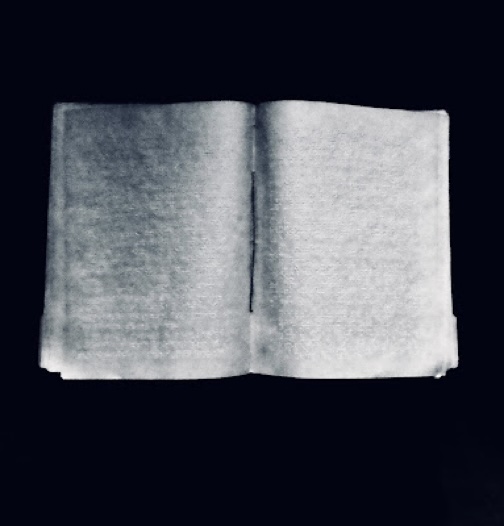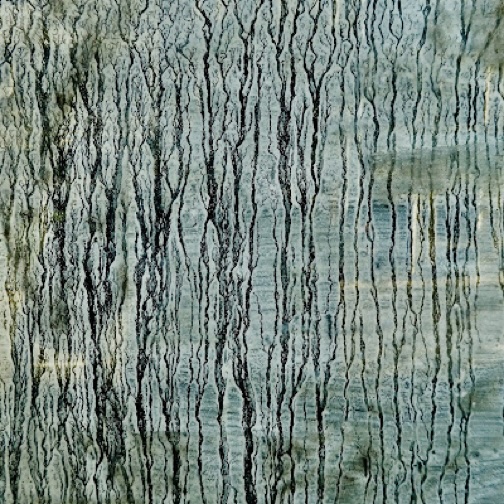Two Stories

photo by M A McDonald
Memento Mori
I make paper from the dwindling supply of plants I find near here, rubbing sheets smooth with stones from my garden walls. I fold and bind these sheets into caches, books, to preserve the histories of the little living things that once surrounded me. I am good at noticing what is disappearing. Their deaths matter to me. So I salvage these remnants, preserve pieces, construct obituaries for them. It is the crushed gnat, the worm dying in the sun, that causes sadness, floods my heart, and drives my bookmaking practice.
I have watched my bookshelves fill over time with what I have found and focused on. Here, for example, titled A, is a book made from pressed specimens, seasonal algae that used to form along my granite window sills. D over there has stitched into it a local dragonfly, now extinct. I is for all illegibly written, faded papered things, reminders, lists, labels and receipts, advertisements, business cards, printed bags and discarded book pages, picturing once common, now lost local insects and common plants.
I am going blind. My doctor says many people in my area are losing their sight, blames the degraded air and water. I imagine it the result of looking too closely and mourning too much.
Last year I had to hire a secretary, to see what has for me become blurred, tactile.
I continue to make my histories. I’ve recently discovered I can press, with a special large stone, notes and images into the book pages when wet, creating tactile mountains and valleys, palimpsests of text and remnants, a landscape of mapped observations.
Two months ago, I lost my voice for a week. The secretary placed her fingers on my lips as I wordlessly spoke, read back to me what she wrote. If a word was amiss, but beautiful, I kept it, grateful for it, a gift, another small kind of forgotten.
We have agreed that we will use this method to communicate again, from time to time, to complement and augment our observations.

photo by M A McDonald
A Maré Salgada / The Salt Tide
When a marshland is lost, what was a tidal wedge can become a ledge, erode, slip and widen, spreading its salinity upriver and horizontally into the freed lowlands.
Salty tears mixed with mucus and oil protect my eyes, lubricant boundaries I need to make sense of this dry and dying coastal edge I see. I scan the estuary. There are fewer birds heard from scorched earth, in water and sky surrounding it.
Tattered red flags flutter from poles stuck into bottom muck. They record the advance of seawater into fresh, as the river turns brackish. Restoring the estuary, as we also advocated for more fresh water flow, the project we started two years ago, is marked in blue. Over there lies the burned black shell of our research station. Two of my colleagues lost their lives inside. After frantically stuffing precious research into a fireproof safe, they fled too late, were overcome by smoke, swallowed by the flames.
Salty tears mix with coastal fresh water. Neither are enough.
It was predicted the fires would die with the rainy season. But the rains were scant, the fires many. Flames are found across the country, north to south, east to west, inland, alpine, coast. Most are relatively small burns, but these accumulate, have caused significant losses.
Why am I still here, sampling, recording, compiling data? Most of my colleagues have fled to riverside cities, the shrinking shores of reservoirs, or gathered their families and left the country altogether. I’m alone here, and I don’t mind. I have cellular service, and use it to send data to the international agency that gave us this study grant. I call my family. I listen, less often than I used to, to the news.
From the bottom of my dinghy, I retrieve more red flags, place them where I’ve measured increased salinity. I look out over the marsh, spot the burned station in the distance. Was it really only six months ago that the country began to burn, a scant month since the deaths here?
Focus.
I retreat to my trailer only after the sun’s begun to slip away. I would have stayed a little longer on the water but I’m famished.
I prepare uncooked meals, have had biweekly deliveries of food, trash removal, received a top up to my large tank of fresh water. I use a solar cell for light and electronics, compost organic waste.
Tonight a young otter appears out of the shadows while I eat, its lanky body awkward on land. She’s thin but sleek, I guess hungry, not sick. I carry a share of my meal, place it near her, offer a bowl with cool water, repeat. After eating and drinking, she disappears quickly.
I wash up, then finish writing my notes from today, make an entry into the computer log, write an email home.
During the night, I dream that my trailer is buoyant, floating in a small lazy stream of water. I look out over the marsh. It’s dawn. The sere grasses of my waking hours are rising from the mist, green and lush. A soft wind carries no scent of smoke. Nuno and Ana, alive and well, are there too, sampling water from the stream. I call to them. They look up, smiling, wave, and return to their work. An otter, perhaps the same one I fed, pokes her head from a den in the bank, slides into the water, followed by a pup. I want to get up, go out. I hear clearly sparrows and a harrier, gulls, the thrum of insects. Far off, there’s a ship’s horn, fog warning, long and low. Strange as visibility is good, I think. Another blast now, longer, closer, and another. It’s not a ship, but a truck horn, close, a sound surrounding my sleep, shaking me awake.
I get up, groggily pull on clothes, open the trailer door. Smoke-filled air, small fires in the distance, a wind, not soft, rising. A truck is indeed there, with a driver sent to pick me up. I have less than thirty minutes to gather up notes, computer, personal belongings. In the last moments, I open the water tank to a trickle, scatter food stores on the ground. As we race out of the marsh, I turn to see clots of flames nearing the trailer.
At the edge of the estuary the driver pauses before turning onto the highway. I can’t look back. I focus on a nearby tree, old, with a hole in its bole. From out of its darkness, a small owl stares at me, at us, its amber eyes blazing.